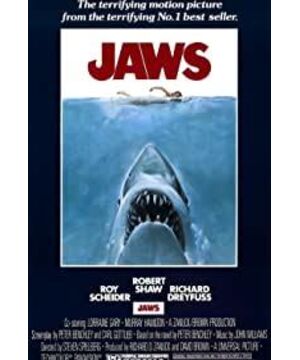"Jaws" is based on Peter Benchley's best-selling novel of the same name. After it was released, it caused a huge sensation. It was shown in 500 theaters at the same time, and the TV was also full of advertisements. People flocked to see it. This disaster film cost 12 million U.S. dollars, but made a profit of 133 million U.S. dollars. It became the highest-grossing film in the mid-1970s. Its strong sales force continued until 1977, due to the advent of George Lucas’s "Star Wars." be broken. While praising the superb artistic skills of the director Steven Spielberg, the US "Time" Weekly also emphasized that "Jaws" is a "very American film." This shows that "Jaws" is not a successful commercial film in the general sense, and we can also recognize its value in terms of its connection with the social thoughts at the time.
It can be said that "Jaws" created a "disaster year" in the history of American cinema, setting off the third climax of disaster films (the first climax was in the 1930s, represented by "King Kong"; the second climax was in 50 In the 1980s, represented by "Monsters from the Sea" and "Poisonous Spiders"), although the 1973 disaster film "The Distress of the Poseidon" also caused a sensation in the society, but the real revival of the disaster film fashion is "Jaws" "In other words, the craze of disaster films in the 1970s was triggered by Jaws after the Americans were forced to withdraw from Vietnam. Recalling the situation of the American film industry in the 1970s, we can see the reason for the return of this wave. After the Second World War, the American film industry developed rapidly, but by the 1960s, due to fierce competition in television, it began to decline. Film output, the number of theaters, and the number of audiences declined year by year, which is far from the old Hollywood spirit, European and American commentary. The world once predicted that "Hollywood will collapse." As a result, film production companies tried every means to find another way out. Shooting large-scale, high-cost luxury films became a common practice, and began to reverse the decline of the film industry. These films have different contents, but they are divorced from reality, and they blindly emphasize excitement and entertainment. They are the so-called "evasionism" films. The films of the 1960s embodied a veritable weakness. American cinema in the 1970s began in this worrying situation. The first thing it encountered was a "theme crisis", which faced serious challenges from Italian and French films. European films are diverse and eclectic in performance themes, and touch social issues to a certain extent and are welcomed by the audience. And American movies are often difficult to extract from the obvious fictional storylines and outdated themes. Therefore, the American film industry strives to update the content of the film, diversify the style and style of the film, and touch the social reality as much as possible. This is the fundamental reason for the resurrection of various fashion films in the 1970s. But due to the stagnation of the US economy, lack of energy, and political turmoil in the mid-1970s, people returned to the movie theaters to escape the stimulation of reality, just like the economic depression in the 1930s. He will feel that his real life is more comfortable than the disaster life shown in the movie. The disasters people encounter in daily life are not as frightening and disturbing as shown in the movie."
Among a large number of "escapism"-style films, there are also films with high ideological content and expression skills that reflect the reality of American society to some extent. "Jaws" is such a film. It can be said that its success is also the result of the combined effect of many social factors. Peter Benchley's novel of the same name was written at the time of the "Watergate Scandal", and the film "Jaws" was released in the historic month of June 1975, six weeks after the fall of Saigon. Spielberg, who is good at restoring genre films, successfully corrected the disaster films at the time, forming a response to the spectacle of the Vietnam War and Watergate in the real world. He deleted the extramarital affair between Hooper and Brody's wife Allen in the original novel, which made the film more focused on the reality of the proposition. We know that the "American Will" reflects the dreams and wishes of the United States. The image of "credibility" it established for people was finally destroyed forever by the Vietnam War. At that time, the social welfarism and excessive government intervention in the economy, The decadent upper-level leadership and the existing system have undoubtedly added fuel to the fire, shattering the "American Will" from the inside out. The "American spirit" was further disintegrated in the face of an arbitrary government that was obsessed with expressing the will of the country, and the escalating illegal activities finally led to the "Watergate Scandal." The public began to hate politics and responded with a cynical attitude towards the sweet words of government departments and various national policies. The fanatical political passions and severe social divisions of the 1960s were replaced by widespread alienation and indifference. Restoring the people's confidence in the country has become empty talk, and the spiritual dialogue between the government and the people has been blocked by beautiful political rhetoric and a hypocritical program of foreign power and medium. By the mid-1970s, the changes in public consciousness were clearly shown on the polls, and the American people lost their optimism about the future of the country. This was the first time in American history. People are deeply depressed, and in the depths of themselves, they urgently need a sense of peace and fulfillment. "Jaws" is exactly the product of this ideological conflict and the tense social situation. It understands that the audience sincerely hopes to get some kind of comfort to alleviate their inner pain. Therefore, the traditional Hollywood theme-the great mortal- Appearing on the screen again, it "indisputably praises the virtues of honesty and caring for the family", reflecting the various worries and people's hopes in the real world.
"Great White Shark" describes the horror story of a remote summer town in New England being attacked by an inexplicable cannibal shark. In the face of the great white shark, the experience of the arrogant and arrogant savage Quint and the knowledge of the oceanographer Hooper were of no avail. Without words, the sheriff with "waterphobia" finally won the victory, as reflected in the film The cross-section of his class and ideology is clearly presented in front of the audience through a rough sketch of several characters. The director's position is self-evident. It highlights Sheriff Martin Brody, who has a family and belongs to the middle class. The mayor, who devotes himself to making money at the expense of the lives of tourists, does everything possible to conceal the truth of shark cannibalism. As the "only sober person" in the town, Brody fought unrelentingly. The upper class oceanographer Matthew Hooper came up with a variety of techniques for observing fish in the laboratory in order to get rid of the sharks and ultimately failed. The arrogant and self-reliant shark-catcher Quint had the courage of the working class, and he also failed. After all, Brody killed the fierce and terrifying shark, and successfully conquered the ruthless nature and hypocritical, corrupt and corrupt politicians. The film expresses a rather optimistic attitude towards American life and the belief that man can conquer the sky. It allows people to forget the ugliness of reality in the face of illusory stimulation. At the same time, it hints at the ills in the real society, and finally gives people the courage to overcome evil and move towards the light.
The film follows the traditional horror film styles, such as ominous music, horrible atmosphere, quiet monsters, strong visual impact, and rough sketches of characters. The film is filled with that kind of cold black humor from beginning to end, cleverly combined with realistic social themes, turning the great white shark into a psychological fear rather than a physical threat. The great thing about "Jaws" is that it combines horror and suspense with the political conflict in the town and people's spirit of conquering nature.
On the one hand, the artistic skills of "Jaws" are reflected in the excellent performances of the actors. In the second half of the film, Brody, Hooper, and Quint catch sharks at sea, which actually shows the struggle and wisdom between the three men. In the contest, chasing sharks is just a background to demonstrate the character and destiny of the characters. Another important aspect is Spielberg's unique use of suspense. He concealed the scary image of sharks as much as possible in the film (the image of sharks was shown frontally at the end), using theme music and sound to repeatedly create a tense and terrifying atmosphere. The music of the film always heralds the coming of terrible shark attacks. This extremely challenging and stimulating excellent design fully mobilized the enthusiasm of the audience, allowing the audience to associate more freely and broadly. When the broad sea level appears, when the horizon in the distance is gradually exposed, when the sea is surging, and when the ominous theme music is played, they all cause terrible signs of sharks coming. It’s no wonder that after the release of "Jaws", Americans who love to spend their holidays on the beach, as long as they think of the faintly appearing in the film, from time to time they jump out of the water to pounce on the boats and attack the tourists. The huge and ferocious great white sharks are all in front of the beach. He stopped, stopped and asked if there were great white sharks in the sea.
People also think of "The Master of Suspense" Hitchcock's "The Birds" again and again, but the characters in Spielberg's films do not have the "weird behavior" and to some extent of the characters in Hitchcock's films. "Guilty". Only at the beginning of "Jaws", the scene where the shark swallows the swimming girl seems to have the style of a Hitchcock movie.
The superb special effects used in "Jaws", the flexible shooting angle of the camera, and the excellent music of John Williams are also important reasons why the film is popular with the audience, and the suspense created by the excellent editing of the editor Werner Fields is undoubtedly also Indispensable, "Jaws" brought thrills and horror to countless audiences. To a certain extent, the suspense in the film is the main reason why the film is popular, and some of these suspenses are skilled by Fields. Created by editing techniques, the shots of the great white shark in the film are three props, a robotic shark and a real shark. Fields edited them together brilliantly and vividly, making it difficult to distinguish between true and false. In addition, he also created a thrilling suspense through the control of the length of the lens and the reaction of the characters in the play. The audience will not forget the scene on the beach where the great white shark attacked the little boy Alex Gentner. The scenes, the suspense of the ups and downs and the faster and faster editing rhythm make the audience want to stop.
When filming "Jaws", Spielberg was only 27 years old, and the success of the film made him a world-renowned director and an up-and-coming Michelangelo in the film industry. His exquisite artistic skills and outstanding director talent made him the backbone of the revitalization of Hollywood in the 1970s. The consciousness of constant innovation and extraordinary imagination in his films attracted a whole generation of audiences from the TV screen to the cinema, bringing confidence and hope for the recovery of the American film industry.
View more about Jaws reviews











